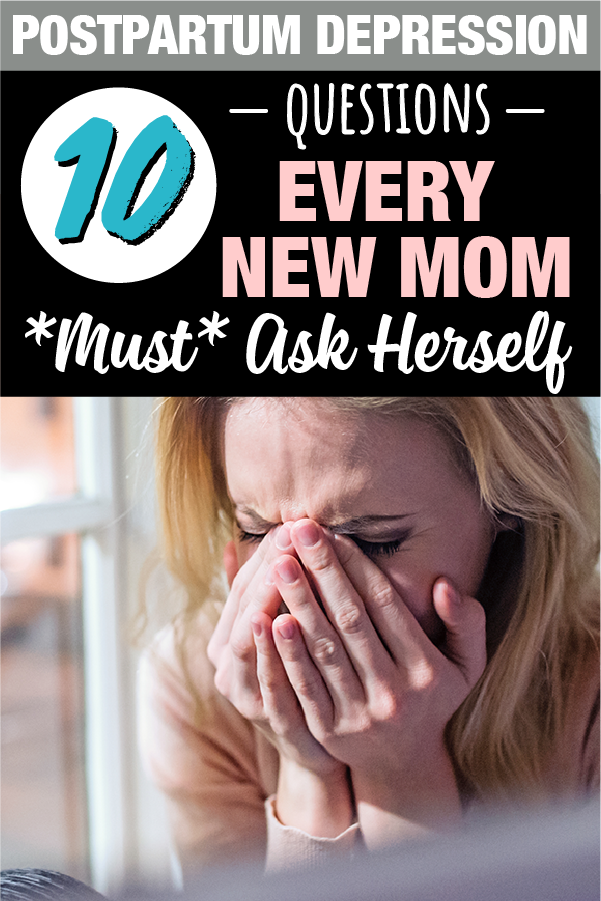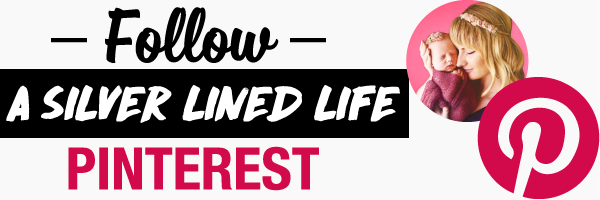
If you are Googling postpartum depression, postpartum anxiety or new mommy blues, in my opinion, you don’t need a long list verifying your symptoms (unless your feelings fall under needing to seek professional help. See this section below). You arrived here due to concern about very real negative, anxious or overwhelmingly dreary feelings. Now that you are here, let’s take a look at what you need to be asking yourself and what you can do right now.
Postpartum Depression: 10 Questions Moms Must Ask
 After labor and delivery, I found myself (the mentally tough warrior woman!) wanting to crawl into bed, pull the covers over my head and cry privately to myself in the dark. On and off, I felt overwhelmed, sad, and hopeless. Sleep would not come and I couldn’t focus.
After labor and delivery, I found myself (the mentally tough warrior woman!) wanting to crawl into bed, pull the covers over my head and cry privately to myself in the dark. On and off, I felt overwhelmed, sad, and hopeless. Sleep would not come and I couldn’t focus.
I knew I needed to do something about it when things fell apart one morning:
I had put our little one down to sleep for her first nap. My husband had gone to work and I started cleaning the kitchen. I cleaned and cleaned and cleaned. Soon, I had everything off every single countertop and every item and drawer from the refrigerator in the living room.
“If I could just get this one more thing cleaned…”
“One more thing.”
“One more thing…”
After an hour and a half, the overwhelm began to turn into panic.
No matter how hard I scrubbed, there was still more…more and more. I felt like no matter how hard I tried, it wasn’t enough. Then, I suddenly felt the same overwhelming thoughts about being a new mom. I found myself having a hard time breathing.
Our little one starting crying in her room, awake from her nap and my vision began to haze over. I immediately called my husband and he talked me through everything, told me to get out of the kitchen, sit down, let our baby cry for a few minutes and he would be home asap.
Afterwards, I realized I needed to come to grips with my new way of life (understand that staying home with our child is precious) and take some steps forward.
Grey overwhelming feelings had turned into days and weeks. The dreary days and tears had become a new norm. Happiness was a word that made me feel sick; I didn’t see how that was possible. I had an in-home visit from a lactation nurse due to some breastfeeding difficulty (probably in part due to repressed positivity) and she outlined 10 questions to ask myself, usually daily, that inevitably turned my grey days sunny again.
RELATED:
10 Unbelievable Postpartum Recovery Tips For Healing After A Vaginal Birth
Top 10 Practical Tips On Bringing Baby Home – From An RN
Before we dive into the 10 questions you must ask yourself before losing hope, consider three things:
I. Positive input can do wonders
Consider reading 15 minutes of a positive thinking book a day. You may feel trapped, hopeless, spiraling or maybe it’s just that you don’t like how you feel right now. Receiving counseling would help but you can’t always have a counselor around and not everyone can afford one.
In addition, positive and solid input from a reliable proven source can be extremely effective. Order one of these books from Amazon or give your nearest Barnes & Noble a call to see if they have one in stock. Make it a mommy-baby-get-out-of-the-house thing.
Try to read even 15 minutes a day out of your chosen book. I never thought ‘a silly little book’ would help change my perspective or aid me in understanding how to insert a single positive thought into my grey, dreary days but I was wrong. Very wrong.
These books helped way more than just a little and continued to change my life perspective towards the positive. Not an easy thing to do! Seriously give these a look:
1. How to Stop Worrying and Start Living
2. Feeling Good: The New Mood Therapy
3. The Power of Positive Thinking
2. When to seek help
The baby blues, postpartum depression, and postpartum anxiety can have similar symptoms. So similar, in fact, that some moms don’t know when to distinguish between them.
Symptoms these all may have in common: mood swings, irritability, sadness, fits of crying and trouble sleeping.
Postpartum anxiety:
However, postpartum anxiety takes it a step further. Your thoughts, at times, may race. You feel panicked like you can’t slow down. You may begin to have irrational fears that develop into fears for the safety of your child or your abilities as a mother. Seek help if your thoughts lead you to feeling like you can’t “do this” AND you begin to avoid caring for your child, even if it’s in little ways. Seek help if you feel in any way like you can’t care for your child. This includes sleeplessness or loss of appetite to the extent where you begin to feel concern about your ability to care for your newborn.
Postpartum depression:
Postpartum depression takes a slightly different turn. You may have some or all symptoms like an overwhelming sense of hopelessness or a sadness that feels soul deep. You may feel disconnected, sleepless, unable to eat, and withdrawn. Romanticized thoughts of not having a baby, or of dropping all this responsibility and picturing yourself somewhere else may creep into your mind. Seek help if these thoughts become overwhelming or if you feel you are beginning to slip in the care of your child.
The common baby blues:
All new mommies will go through phases of not showering, sleeplessness, irritability, sadness, thoughts of life like it was before without baby, and withdrawals from social life. This is normal. Further, postpartum depression and anxiety are ALSO normal. Even though it may feel like you are a completely different person and there is NO WAY this could be normal! The bottom line: seek help from your spouse, friends or your doctor if you fear you are unable to care for your child or yourself. Seek postpartum help groups. There are many!
3. Postpartum depression & anxiety *are temporary*
It may seem like that light at the end of the tunnel (you remembered from once upon a time) will never come again. As if this is your life now and you couldn’t even imagine an hour without the dread, anxiety, hopelessness or overwhelm you feel right now.
The bottom line to remember: most ALL moms with postpartum depression and anxiety will recover 100%. This is especially true of moms who seek help and treatment early on. So, reach out to someone now if you have any feelings outlined in the point above. The quicker you get help, AND the more effective your treatment, the faster you will overcome this.
Finally, let’s get to those 10 things you can ask yourself right now.
10 questions to ask yourself when you feel completely hopeless or erratically anxious:
1. Have you been outside for a decent amount of time lately?
Have you ever been inside for a lengthy amount of time, stepped outside and felt yourself physically relax or sigh?
Being in an outdoor environment has been proven to increase your health, mood and help with depression. If it’s not raining or super cold out there, don’t take for granted how much a ten-minute walk can help your mind, mood, and body.
Try out that new stroller or your new baby wrap (we got 4 for our baby shower and The Moby Wrap, hands down, is the best) and force yourself to go for a walk, even if it’s super short!
2. Have you taken time for yourself and most importantly: allowed yourself to relax during this time?
On day 2 of having our newborn at home, between breastfeeding, I took a trip to Target down the street. Walking out the door, I remembered a coworker of mine telling me I wouldn’t be able to even part with my baby. She said, “I had to go the grocery store five days after our baby was born and I cried the minute I walked out the door and all the way there.”
Now, each mommy is different, but girlfriend, you NEED to take some time for yourself.
Ask your significant other or someone else close to watch your baby and go take a long, nice shower. Get out of the house and get Starbucks while shopping, get a pedicure or go buy a new shirt. Whatever you do, try to get out, breathe and allow yourself to relax.
3. Have you spent *positive* quality time with a friend or relative lately? Resist unhealthy isolation.
The line past “unhealthy isolation” is different for everyone. An introvert may be okay going a day without seeing anyone except their baby. I certainly was! But eventually, this can easily become an excuse. Quickly, especially with melancholic thoughts or anxiety, the introvert needs to share these thoughts in order to help overcome.
Multiple studies show that even new mothers who call their own moms during this time have lower levels of postpartum depression. Reach out, speak to someone who can talk back (unlike your newborn!) even if it’s just on the phone today.
4. Have you taken care of yourself today?
Taking a newborn home can be the most overwhelming ordeal. Your little one needs SO MUCH. It seems, almost every minute, they need you for everything: eating, changing that diaper a thousand times, sleeping for 2 minutes, crying for 10 and attending to every single basic need around the clock. *PHEW*.
A few days in, I realized I hadn’t showered, changed, brushed my teeth or ANYTHING. I barely ate. I barely slept. My every waking thought was what the baby needed now or next.
This can stretch into realizing it’s 3 pm, you feel like the world must have been enveloped in a haze of grey, it’s been two months since you had your baby and you haven’t taken care of yourself again.
Really try to make time to shower, brush your teeth, put your hair up and maybe put on something that doesn’t make you feel homeless. You will feel better, trust me.
5. Have you tried to think positive thoughts?
It’s easy to fall into negative thinking. My counselor one time told me, “It can be an indulgence. My mother once told me ‘that’s a pity party I don’t want to attend’. Try that out instead.”
Exercise taking captive your negative thoughts. Try to take small steps, catch yourself and turn away a few at a time at least. It’s unlikely you will suddenly just see rainbows and butterflies but actively exercising taking those thoughts captive will pay off. Your baby is learning all about this new world, take things little at a time. You are doing the same.
6. Have you eaten well, taken your vitamins and drank water?
Fast food and snacking is easy, thoughtless and requires basically no effort but it can make you feel super blah. I know it does for me! Try to carry around a good water bottle you’ll actually drink out of – even if you have to buy a fancy one. Just do it. Remember to keep taking your prenatal vitamins and keep some greens in.
On the other hand, don’t beat yourself up if you order take out and gobble up more Chinese food than you’ve ever eaten before. You just had a baby, you’re recovering AND taking care of a brand new life. That’s frickin’ exhausting. Try to eat healthy but don’t hate yourself or how you look just because you ate something unhealthy.
This kind of thinking is FAR worse than eating bad food.
7. Have you moved around?
Binging Netflix may seem awesome (and sometimes it totally is) but after a certain amount of time, too much couch-potatoing becomes inhibiting. Escaping into TV and zoning out of the real world stimulus can do some pretty negative things. Make sure you are getting up at least every hour (if are physically able) and walking around for a few minutes minimum.
You may be shocked at how much this helps you mentally and physically. There are good reasons why certain fitness brands signal you when you’ve been sitting too long. If you’ve been feeling blue, hopeless or erratic don’t dismiss this point and dive into your television or computer more.
Force yourself to get up, try to do one thing around the house, hum a tune or turn on a song you love.
8. Have you tackled a task today?
Letting the dishes pile up, the laundry grow higher than Everest and leaving those baby-spit-up stains on your clothes until they start to layer will drag you down. You may never want to think about putting a single dish into the dishwasher or sorting even one article of clothing. Your brain may scream “ABSOLUTELY NOT. There is absolutely NO way I’m doing that. It’s not an option.”
You may feel a sense of overwhelm, hopelessness or anxiety so high that thoughts of doing any sort of task bring down a solid, unmovable and heavy wall. “I can’t.” “I won’t” Your brain says.
If this is what you are feeling, kindly tell your brain to EFF off.
You are in control this moment. Do just *one* thing. Make your bed OR change your clothes OR put one load of dishes in the dishwasher. Maybe take a shower with your little one in a bouncer, the curtains pushed aside so you can see him or her the whole time.
Do one thing and truly congratulate yourself. Most importantly, let yourself feel accomplished.
9. Have you asked for help with baby?
You probably feel like you’re the go-to #1 human for your baby right now. Okay, so this makes complete sense. Mommies just know…things. Somehow. Baby screams like a tortured alien and your significant other gets frustrated. In moments you have that baby soothed cooing AND asleep. You don’t even need to watch the clock to know the last time your little one pooped, peed, nursed, spit up or burped.
You are it, mommy, and you know it.
That doesn’t mean you have to do it all every single moment of every day. Your significant other will do probably everything different with your baby. You may bite your tongue wanting to show him the proper way to swaddle or put that diaper on correctly or soothe your baby to sleep. Go ahead and bite that tongue, walk out of the room and let go. Do something else.
Let other people care for your baby and learn. Your baby will be fine! Babies cry, have their diapers fall off and whatever. Just because you can do this 50 times better, doesn’t mean taking care of your little one has to be all on you.
When you begin to let others help, that load will lighten. Soon, you will realize that baby doesn’t need you 100% of the time. It’s not all on you! Let your significant other learn how to do everything, as well as other family members and train a few trusted babysitters.
Absolutely do not find yourself in a place where you are the only one you trust with your baby.
If you haven’t asked for help with baby, do it today.
10. Have you meditated or prayed?
Most Americans weren’t raised learning how to meditate like other cultures and yet it has amazing, positive effects on depression and anxiety.
Studies show meditating and deep breathing help considerably with stress, anxiety and depression. Meditating has been proven to help your heart rate, lower your metabolism and aid in breathing, brain waves and many other important bodily functions – all helping you have less stress the rest of the day.
Google how to mediate for beginners and/or take some quiet time (when you get it), close your eyes and spend time in prayer.
Conclusion
Having a brand new delicate, extremely needy life to take care of (that depends solely on you to survive) amidst sleeplessness, tremendous pain, healing, dealing with relatives, and being away from work can turn your entire WORLD upside down. Even the strongest women face “baby blues”, postpartum depression and anxiety after childbirth.
Even though you may not feel like it, you are strong. You just had a baby.
The bottom line, sister: you are not alone. Do not be afraid. You are strong. Taking steps in order to conquer these feelings does not mean you have to take on the world. Take it slow and try to put one foot in front of the other, moving away from the negative: ask yourself these 10 questions. Once you do, make the effort to change things up, even if at first, it’s small. You will be surprised at the difference it makes in your life. You’ve got this.





2 comments
This was powerful Nicole! I understand being vulnerable and sharing these difficult moments in life are scary, but I wholeheartedly applaud you! No one will ever know how many lives they can impact until they decide to bare their soul.
NicholeXoxo
Totally agree. Thank you, Nichole! <3